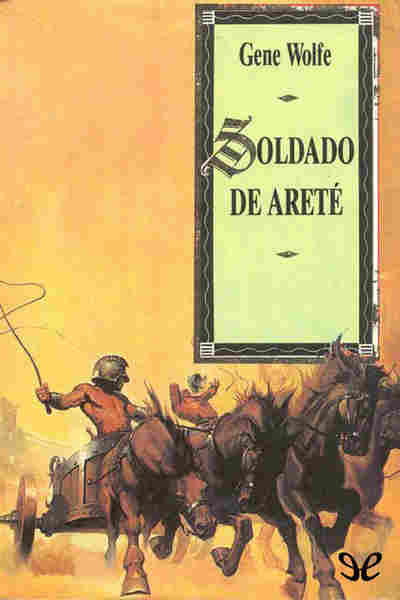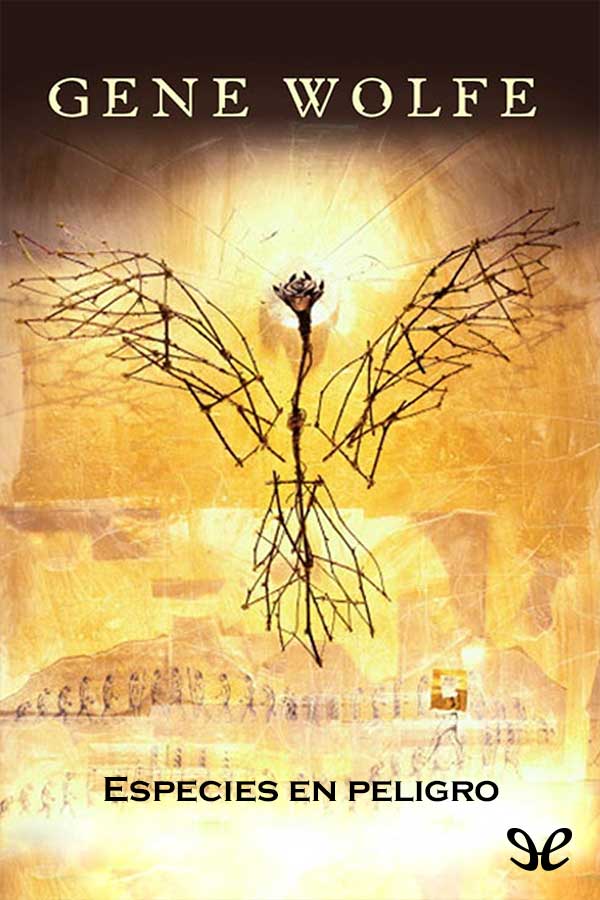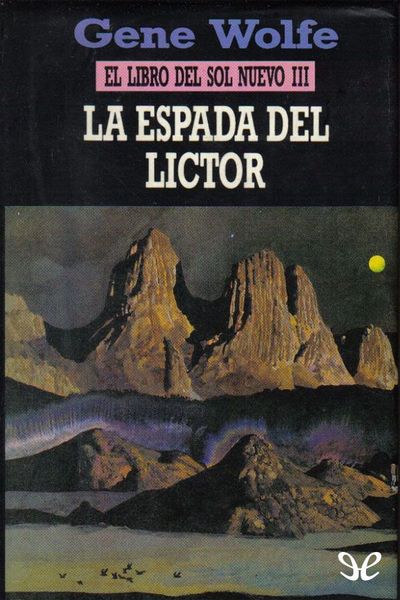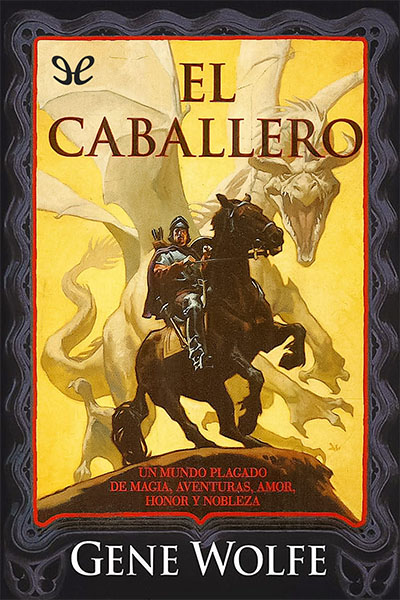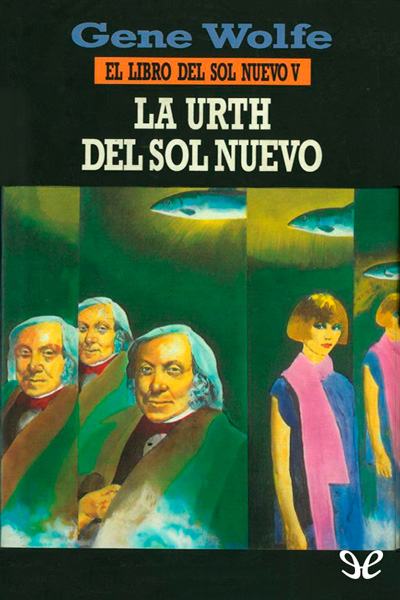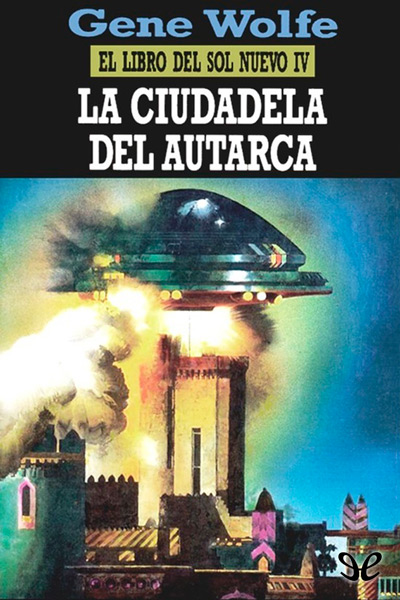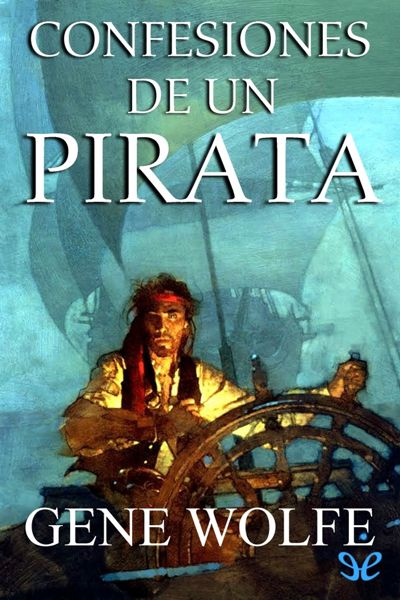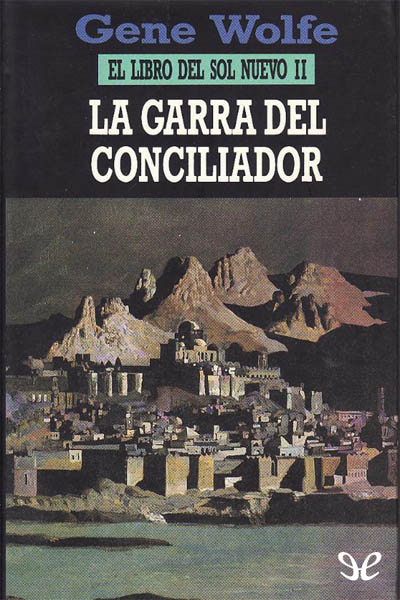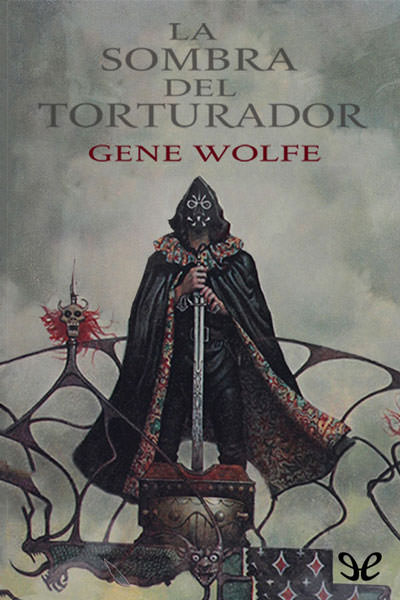oleebook.com
The Wizard Knight de Gene Wolfe
de Gene Wolfe - Género: English
Sinopsis
"Gene Wolfe is the smartest, subtlest, most dangerous writer alive today, in genre or out of it. This book [is] important and wonderful." Neil Gaiman on The Knight
A novel in two volumes, The Wizard Knight is in the rare company of works of fantasy like The Once and Future King, or The Wizard of Earthsea, that drink directly from the wellspring of myth. Now it appears in a single-volume edition for the first time.
A young man in his teens is transported from our world to a magical realm consisting of seven levels of reality. Transformed by magic into a grown man of heroic proportions, he takes the name Sir Able of the High Heart and sets out on a quest to find the sword that has been promised to him, the blade that will help him fulfill his ambition to become a true heroa true knight.
Inside, however, Sir Able remains a boy, and he must grow in every sense to survive what lies...
Descargar
Descargar The Wizard Knight ePub GratisLibros Recomendados - Relacionados
Reseñas Varias sobre este libro
I TRIED. epic-fantasy47 s Terry 415 2,152
This review covers both volumes of the Wizard Knight duology.
Gene Wolfe and I have an interesting relationship. Of course we have no actual relationship at all aside that which belongs to any reader/writer pair, but since I'm reviewing a book that's fair enough. Here's the thing: I really want to be one of those people who can sing Gene Wolfe's praises to the sky and knowingly wink about all of those complex and enigmatic stories that I totally got the first time I read them. But I can't. Don't get me wrong, Wolfe is obviously a huge talent and I much of what he's done, but sometimes I just think he's more concerned with composing an elegant literary puzzle than he is with just giving us a good story. And sometimes I'm not even sure the supposedly complex literary puzzle is even there. I mean, have you ever perused some of the ideas and theories about everything Gene Wolfe has written that are on the Urth listserv (http://www.urth.net/urth/)? Have you? I dare you to go and wade through even 1/8 of them. Good. You back? Now....do you believe it!? I mean, it's crazy, right? There's no way that anyone knows everything about everything the way Wolfe apparently does and then codes all of those nuances into every word and punctuation mark he's ever written, right? Right!? Please say you agree, because I to think I'm a pretty smart guy, but just glancing at some of those supposed 'references' and subtexts that Wolfe is apparently making makes me feel a total moron.
Also, there's the fact that many of Wolfe's protagonists are, how to say it? Generally pretty annoying people, I think is the phrasing. I'm looking at you Patera Silk! I mean, really, can any of you tell me that you actually got part way through the books of the Long Sun without wanting to reach into the text and slap Patera Silk silly and tell him to "Fucking wake up!"? I mean, following this dude around for four large size books as he well-meaningly drifts in a holy stupor from one crisis to the next, forever agonizing over his moral inferiority is a fairly trying experience. And Severian? Well, let's just say that the boy's got some issues, even beyond the obvious. At least Latro has the excuse of actual brain damage for his behaviour.
All of this is merely a preamble to say, I understand and feel for all of you that scratch your head and wonder what all the fuss is about when everyone and their brother (I'm looking at you Neil Gaiman and you too John Clute) go on about how Wolfe is the Tolstoy, Shakespeare, and Proust of the speculative fiction world and if you just don't get it you're just not trying hard enough, damn it. I love most of the Books of the New Sun, though it took me two read-throughs for that; I thought the Books of the Short Sun had some of the most amazing writing he's done and I look forward to going back for my second dip; and man, those Books of the Long Sun? Well....I really _want_ to them, I mean there's some really cool ideas buried there underneath all of that Patera Silk.
Anywho, I'm supposed to be talking about The Knight in this review so maybe I better start that now. This book and it's companion volume The Wizard are my very favourite of Wolfe's books that I've read thus far. To be fair they already had a leg up on the others due to the fact that they mix three things I really love: Norse mythology, Christian mysticism, and Chivalric romances into a rather tasty stew. Maybe this simply means that I'm getting a few more of the references that I'd have otherwise missed if this were one of his other works. Regardless, I thought Wolfe did a great job blending those things into a believable and really interesting world.
The protagonist, Able, is a lot most of Wolfe's other protagonists (that I've come across thus far anyway) in that he's another variation on the holy innocent archetype, with an emphasis on the innocent (in the sense of naive, NOT morally blameless) and much less so on the holy. He's a boy from our own world who wakes up one day to find himself magically transported to a medieval fantasy world and given a push onto the road of a magical destiny. All sounds pretty pedestrian so far, right? Well, keep in mind that Wolfe is doing something different here from the run of the mill quest fantasy. Able goes through a lot of growing pains on his journeys, from falling in love with an elven fairy who turns him into a full-blooded man (both literally and figuratively) a bit ahead of time, gaining a demon-dog companion and accreting to himself one of the motliest bands of travellers this side of Russell Hoban's Pilgermann. Able really does grow significantly from one book to the next as he learns to earn the manhood that was thrust upon him and goes from callowly fulfilling most of his adolescent male power fantasies to taking upon himself the load of responsibility that his position ultimately earns him.
There are some really great characters here that cross Able's path, from the lovable hound Gylf and the loyal manservant Pouk, to the irritating yet complex Svon and the suave, evil, and utterly likable, Garsecg. Even these secondary characters are allowed to learn and grow and do more than provide background colour for the tale of Sir Able of the Hight Heart (as he christens himself): Svon starts out as a real pain in the ass, a git we want to see humiliated in every way possible, but we learn to see him as something much more complex than a stuck up prig; and the story of Toug's growth from boy to man is at least as important, and central to the tale, as is Able's. In many ways Able acts not only as our window into the world that Wolfe has created, but also as the enabler (ha, en-Able-r...did you see what I did there?) for the growth of the secondary characters who have followed him throughout his story. Ultimately Able earns his place by growing into the man he needs to be and living in such a way that those people whose lives he has touched cannot help but react to him in a manner and, for good or ill, become something more than they were.
Edit, Nov. 28, 2011: I was going to demote _The Knight_ to a 4 star on this re-read given a few of Wolfe's tics that were bugging me in the middle of the book, but the ending, and those elements of it that do work so well for me, convinced me to keep the 5.fantasy39 s Spencer Orey583 174
My kid has a picture book called "What if I Could Drive a Dump Truck" about a kid who imagines what it'd be to be a big guy doing jobs with a big truck.
That's basically also what this book is.
The kid (called a teen but seems younger) gets magically sent to a different world and shortly gets transformed into a big muscle dude, and he decides to be a knight. Then he has knight adventures. It's pretty chill overall. There are multiple worlds and fairy things and evil giants. There's some uncomfortable stuff about probably evil fairies who call themselves the knight's slaves, so that was dated and bad.
But overall it was kind of nice to just have a chill knight adventure book. I didn't have to worry about him or get too invested in whatever personal trauma drama he was going through. He just had knight troubles and tried to do his best. Not sure I'll go back for part 2 though 29 s L.S. PopovichAuthor 2 books376
The Knight is the first part of Wizard Knight. The Wizard being the second. He might have titled it Knight Wizard instead. It delivers in many of the ways Wolfe fans would expect, but offers a fresh feel to boot. It is an approachable classical fantasy novel. Its slow pace may not appeal to all, but its intellectual depth is characteristic of the author. Gene Wolfe makes use of deception again in the form of a first person narrator with a child's mentality, partaking in a fantasy adventure with simple constraints and set-pieces masking complex world-building. At bottom it is another tale about the fight for what you love, the courage dreams inspire.
It shares some images that correspond to common dreams, and in this way the construction of a dream flows through the story, as does the construction of a hero. Dream-logic and fantasy-logic are utilized to great effect, and for a child hiding in an adult's body, Able makes for a fascinating character. It is convincing in the same way a dream is, and though many initial causes are left to the reader's imagination, the book gets better the further you proceed and makes for an easy, light, Wolfean adventure.
Sir Able's learning curve can be steep at times, but he picks much of it up quick. From sword-fighting to archery. Of course he meets the requisite number of dragons, orcs and fae creatures. He ventures between realms and meets with more than one suspicious innkeeper. It bears much resemblance to Jack Vance's light fantasy yarns, which I know were a big influence on Wolfe. Able makes his share of mistakes, leading to occasional comedy, a mcguffin or two, and plenty of opportunities to interact with a glorious cast of fantasy-trope-weilding jokers. But he embraces the role thoroughly. All in all, the tale is told in retrospect, with the benefit of a lack of confusion in the narration, with the organization that comes with time, experience and familiarity. It is a comforting tale in my opinion, rather than one wrought with anxiety and tension. There is peril of course, but I could always depend on the hero to pull through, almost to a fault.
Drink the water and eat the food of the faeries and you will be trapped in their world. Everyone knows that by now. But you really want to see the main character partake of these escapades, and a little trouble never does them any harm, since at the end of the day, they're going to return home safe and sound. Right? Okay, maybe with a only a few stab wounds.
I figure they split the novel in two for marketing reasons. If the second part goes down as easily as the first I will have to binge-read it as quickly as I did this one.2020 5-star fantasy ...more23 s Juho PohjalainenAuthor 5 books334
As far as Gene Wolfe's illustrious and often inscrutable work goes, I feel I'd name The Knight as one for Beginners. Sir Able's quest and character feel far more tangible to me, far more easy to approach and understand, than, say, Severian's journey through alternate-universe future hellscape where very little makes sense. I to think that I had most of the pieces of his puzzles there in my hands, though I still could not always put them down the right way... though it's of course possible, ly even, that there was a whole other puzzle here that I altogether missed.
I do wish I'd started with this one. If you feel curious about Gene Wolfe and want to read some of his, you could do worse than The Knight.15 s Christopher1,305 184
Gene Wolfe's THE KNIGHT is the first half of a fantasy diptych called "The Wizard Knight". Abel, an American boy in his early teens, finds himself transported to another world with similarities to Norse mythology, divided into seven tiers of reality. Abel lands in Mythgarthr, a plane similar to medieval Earth, and dreams of becoming a knight. He has intriguing interactions with the Aelf, a race of elemental spirits and tricksters, and the dragons who inhabit the worlds below, and he has his sights set on the flying castle of the Valfather in the world of Skai above.
Over the three decades prior to THE KNIGHT, Wolfe had developed a distinctive method of storytelling where narrators are unreliable and some important plot events are not described directly, but left to be subtly revealed though other events. Certainly this helped make early Wolfe efforts THE FIFTH HEAD OF CERBERUS or "The Book of the New Sun" so great, though these works also had a number of other fine points such as excellent prose and clearly developed settings. Unfortunately, with THE KNIGHT it seems that all that is left to Wolfe's style is this principle of unreliability and enigma. Abel gratuitously leaves so many things undescribed for no reason other than Wolfe being stuck in a rut of book as enigma. Half of the action is passed over only so that Abel can fill it in later, the human characters are wooden and even the amusing animals seem throwbacks to earlier Wolfe novels. Wolfe's use of Abel as narrator, writing a long letter to his brother Ben back in America, is also inconsistently applied. For the most part, Able writes a 13 year-old kid, but at times he launches into highfaulting explanations or ethereal descriptions of the plot where it's clear that Wolfe has taken over as he would in third-person storytelling. And Abel's boyhood reluctance to write about sex and violence becomes most apparent only after he has become a man and has already been through fierce battles and gotten lucky with a fairy queen.
I read THE KNIGHT as soon as it was first published in 2004, as Wolfe had been favourite writer for many years. My disappointment with the book was so crushing that I stopped following what Wolfe has written since. Sure, if you're looking for a riproaring fantasy novel, then THE KNIGHT may entertain you, though you might not find all of it to your taste. But when Wolfe had written some major masterpieces, a novel that can only be satisfyingly read as light entertainment seems a failure.14 s AnthonyAuthor 10 books26
Wolfe is a flawed genius. I read this book and it's prequel in 48 hours while I with laid up with a cold. It is easily one of the best fantasy books I have ever read. I would put it an a shelf next to Lord of the Rings and Alice in Wonderland. While it's achievements are incredible it's shortcomings are equally enourmous. Wolfe as usual has created an enormous and breath takingly realized world. One that is vivid and recognizable as well as wondrous and strange as fantasy should be.
His prose, dialogue and characters are masterfully done. His command of plot is stunning. As usual the mobius strip creation he makes out of the over all plot is a tour-de-force- a puzzle that a game of chess is working on many layers. A reader could return to the book again and again and find new hidden meanings and riddles. ( I still find myself scratching my head over the time travel trickery involved in his magnum opus The Book of the new Sun).
However . . . unfortunately, Wolfe's strengths as a writer seem to have blinded him to a huge list of annoying tics and traits flaws that made hundreds of pages so unenjoyable it was at times unbearable to keep reading. The major ones are worth noticing for any writer, fantasy or otherwise:
1. He often skips the battle scenes or glosses them over hastily.
2. In order to create his abundance of puzzles and riddles his first-person unreliable narrators withhold essential infortmation over and over again. Pull this trick once in a great while and it is a formidable device with powerful results. But doing all the time and it feels your being taken for a long ride by a story teller you can't trust. No reader enjoys that.
3.The middle of the book should have been trimmed a lot. (Basically everything that occurs in the land of the giants is extremely dull.Unfortunately that's a third of the series. The beginning is 5 stars the end is 5 stars the middle is zero. I speculate that Wolfe knew his begining and end but created filler in order to stretch a 1 volume story into 2 volumes)
4. His heros are too virtuous. The reader never feels there is much chance of the hero actually failing.
4.5 And because his heros are so dependable, his HUGE cast of supporting characters are sadly not given much to do. They do a lot but it has no GRAVITAS. It matters not, as they are overshadowed by the main character. Which is a shame because all of his characters are vivid and often quite beleivable. This is perhaps his biggest flaw.
5. His characters spend way too much of the time playing 20 questions with eachother. Wittily fencing with eachother, trading little bits of information. It is a strange tic that he imbues all of his works with.
Lastly all of Wolfe's work is basically a re-telling of the story of a Christ figure.This, and the fact that he is quite challenging is probably why he is not more popular.This writer is a maverick and his mistakes are as big as his talents.I am sure I will ponder this book for a long time to come. wise I don't plan on reading another book by Gene Wolfe for a long to to come either.12 s Althea Ann2,239 1,105
The Knight - Gene Wolfe
The Wizard - Gene Wolfe
One story, two books.
I expected to LOVE these - I'd really been anticipating reading them.
But - I didn't love them. I tried, but I just didn't.
For one thing, this story uses the exact same gimmick as Wolfe's The Book of the Short Sun trilogy (you are reading book written for an unseen, not-present person). Not only that, I am sorry, but the narrator has the EXACT SAME VOICE as in that other book. It is written as the exact same character, even though superficially, they are supposed to be two very different people. If you've read one of these books, the similarity will be unavoidable and distracting.
Another distraction is that the main character is an American boy who, wandering in the woods, slips into a complicated hierarchy of seven other worlds altogether. Due to the magic of an Elf-Queen, he is instantly transformed into the shape of an older, big, muscular man.
The shape/age change is used in the book to some degree, mainly for the repeated philosophical observation that most men feel boys masquerading as men.
But the fact that he is American, or even from our world, is not utilized in the story at all. He forgets most of his life in our world, it hardly ever comes up, and is not essential to the plot in any way. It's just an unnecessary complication. Odd things occur - and it's almost as if the character just doesn't react - not an American would react, and really not the typical inhabitant of the world where he is would react either. It's just sort of odd. And dull.
I hate to say it, but the books are kind of boring. They're slow-moving, and I just didn't feel that Wolfe's usage of classic fantasy elements worked very well. (Not nearly as well as in any of Wolfe's other books that I've read.) His hierarchy-of-worlds had some interesting elements to it, and some of the characters, especially the fire-elf 'sisters' were cool - but I feel it either needed more action or a more-coherent philosophy pulling it all together. 10 s Nicholas KotarAuthor 37 books298
Second read through: even better than the first. The allusions in this book are ridiculous. there are layers beyond layers. but you really need a lot of patience. 10 s JohnnyAuthor 10 books130
Gene Wolfe is a master at offering something that seems familiar and giving it an amazing freshness. I never would have thought that I would have d reading about a torturer in an Inquisitorial environment before Wolfe gave it his spin and my first glances at the covers of The Wizard Knight series failed to give me any clue as to how different this book could be from standard fantasy fare. The Knight seemed to start off with a familiar psychological trope. When I began reading this account allegedly sent by the protagonist to his brother Ben in our world, I thought Wolfe was going to tread the familiar ground of Donaldsons white gold wielders and Brooks Landover with their respective psychological membrane between the two very different worlds. Unless the second book is handled very differently from the first, my initial impression was wrong indeed.
If I were to describe this book in the language of a wine connoisseur, I would suggest that I perceived elements of Farmers Riverworld (without that marvelous riverboat, of course) on the palate with hints of Farmers World of Tiers in the finish. Yet, even such rich connotations only touches on a surface element, Wolfes fascinating continuum of seven worlds from Niflheims Norse-sounding origins at one end to Elysions Greek-sounding dimension at the other. In between, there are marvelous re-interpretations of classics the Green Knight of medieval England and the land of faery generally tied to Celtic mythology. Even this description seems superficial.
Perhaps, I could describe this as a coming of age tale, a narrative of maturing innocence. Such a simplistic description would be technically correct, but would probably suggest more of a Young Adult novel than The Knight represents. One might describe Wolfes play with the time continuum such that the different worlds have different paces, but then one might think it was a time travel or time paradox narrative. It is not.
In short, The Knight is a mystical, magical fantasy with some scenes that seem as gritty as some of Game of Thrones without sacrificing the magical elements and supernatural mystery. The novel explores the self-discovery of Able, the protagonist who is knighted by a faery queen but attempting to function within the restrictive feudal system of the world where he seems fated to come into his own. Yet, the story has an epic scope without the distracting acrobatic moves from character to character in most epic novels. The perspective is as focused as Sir Able of the High Heart is himself. As such, it is an incredible book and has me on the lookout for the sequel.
fantasy9 s Christopher1,158 34
Every Gene Wolfe novel is a f'n revelation. Consistently challenging and constantly rewarding, this first of a two volume series has been described as his most "accessible" and it's easy to see why. It's Wolfe's turn at high fantasy. And tells the story of an American teenager who quickly finds himself (without explanation, because none is needed) transported to a fantasy world and imbued with great strength and stature and the rank of "knight."
He quickly falls in love (lust) and goes a-questing on behalf of his quasi-mystical love. This is Don Quixote and it's wonderful.
Wolfe's novels are less about the destination than they are about the journey and this is one is no different. But with every encounter, he imbues Sir Able of the High Heart (because he's a knight you know) with the arrogance and ignorance that all teenage boys would act with if thrust into the "hero" role they so thoroughly crave and fear.
Wonderful in every respect. 9 s Pierre120 1 follower
When a novel starts off with a glossary, my eyes roll. When an author tells you in the second paragraph of the book that I am wasting my time reading the preface, I get annoyed. And when the author tells me this as a first person narrator, I get nauseous. And when the writing of the first three chapters fails to draw me in, I give up and toss the book into a pile to be returned to the library. Guess I won't be reading any more Gene Wolfe.fantasy librarybook scifi ...more7 s Ints777 77
J?zi?, ? nu bija viena gr?mata. Izlas?ju un t? ar? neko daudz nesapratu. Iesp?jams pie vainas tas, ka neesmu p?r?k liels bru?inieku rom?nu speci?lists. Gr?matas galvenais varonis Sers Eibls no Haih?rtas ir ?stens st?stinieks. Kam gan nav gad?jies p?rg?jiena laik? nokl?st no takas un spie?im nogriezt ?rk?ain? apels?na koku. T?da lieta nevar palikt nesod?ta un Eiblu aizved sev l?dzi s?nu elfi. St?st?t?js protams ir pats Eibls un st?sta vi? ?oti savdab?gi, reiz?m pag?tni, reiz?m n?kotni. Katrs st?sts ir pilns ar atsauc?m uz to kas v?l tikai b?s un nedaudz izgaismo to kas jau bijis. Un ne vienm?r viss ir piln?ga paties?ba, bet galvenais jau ir bru?inieka gods nevis kaut k?das tur zemes lietas. Tikai te neb?t nav zeme, bet pasaule, kura sast?v no daudziem sl??iem, no augas tikt lej? uz zem?kaj?m pasaul?m ir viegl?k par vieglu, bet uz augu praktiski nere?li. Tas gan tikai tad ja tu neesi izcils Bru?inieks, tad ar? nok??ana Sky nav nek?da probl?ma.6 s Christian McKay HeidickerAuthor 9 books225
What a bizarre journey. One moment I was enthralled, mystified, anxious to turn the page, the next I was glazing over, bored, ready to quit.
I love how passive the protagonist is about all the fantastic situations he finds himself in. But that also contributes to the mundane feel of it all. I wavered back and forth between wanting him to have a bit more personality and happy he was so hollow so I could step into his skin and enjoy the ride.
Wolfe is a master of atmosphere, but the story reads playing an MMORPG. I guess that's who I would recommend this to. Gaming nerds. Overly ambitious quests that can't be completed until you finish a dozen others (resulting in a hundred pages of seemingly random wandering), beautiful ever-changing environments, and characters that may speak they're from a fantasy world or the fourteen year old brat down the street.
Don't really have any interest in reading the second one, unless someone can tell me that the structure changes completely. 6 s Andrei(Drusca)256 59
Mi s-a parut prea intortocheata. Mi ar fi trebuit sa am un dictionar explicativ sa pot aprecia la valoarea ei aceasta carte.2022-reads7 s Mike (the Paladin)3,147 1,919
Another book that may be better than I'm rating it. Admittedly I've had a bad few months (read couple of years). This is the second time I've tried this book and it just doesn't hold my interest. I've read better Wolfe.
The attempt here is to tell a story from the point of view of a boy "yanked" into "manhood" (apparently body only) by a queen of the Aelf (I'd call her a Fairy Queen), who is apparently guilty of statutory rape. The boy/man continues with an obsesive love for "Disiri" from then on. I would say this is Wolfe's attempt at relating the situation to the "courtly" or "chivalric" love from older type stories.
I realize that Wolfe is shooting for an older style of story telling here and I have read those who go on about it in wonder and love it. Okay, fair enough, that doesn't mean that those who are less than enchanted by the way this story is related are somehow "less literate" than those who are enamored with it. There may be a reason we don't primarily use this form of story telling anymore. This book comes across as always slightly disjointed and almost hesitant. (In this case the "unreliable narrator" is really unreliable.) I really never got close to the narrator of this story. (By the way I've read mallory etc. and the fact that it is Mallory gives it a charm that this [for me:] lacks).
To each their own and if you it great, but not for me, I just couldn't get into it.fantasy5 s Bart408 98
(...)
The Knight has a pompous title, and Wolfe makes pompous claims to Truth as fathers of boomers might make. Part of The Knights appeal indeed is the Romantic idea of an heroic past that never existed. Lots of boys want to be the unacknowledged son of the king as Richard Rorty once said. And there surely is no shame in enjoying well made stories this as a grown-up.
There might even be value in stories this to teach children the value of honesty or compassion even though I would not want my children to take Sir Able of the High Heart as an example quarrelsome, reckless, violent, and morally inconsistent as he is in this first part. Able makes lots of promises he doesnt keep. I hope Sir Able and with him Wolfe will redeem himself in book two, that allegedly focuses on the Bildung of wisdom indeed.
Entertainment or boyish guilty pleasures notwithstanding, with adult wisdom, and an honest acknowledgement of the plethora of human atrocities committed in the name of God, Truth or the King, we have to acknowledge it for what it is, this idea of an heroic past that Wolfe perpetuates to his defense, so many others do. It is an honest, misguided dream maybe, a naive longing for something that never was.
Theres truth in names, sometimes: it will forever be a Fantasy.
Full review on Weighing A Pig Doesn't Fatten Itreviewed speculative5 s Vderevlean484 154
3.5 stele.
Cavalerul difer? mult de ce îmi aminteam eu din stilul ?i subiectul romanelor lui Gene Wolfe. E un roman rapid, aglomerat, cu o mul?ime de personaje secundare ?i o mul?ime de quest-uri minore care vor duce probabil spre un final furtunos. Acest volum se opre?te undeva la jum?tatea firului narativ probabil.
Seam?n? cu un joc RPG, se cite?te repede, din p?cate la fel de repede ui?i unele personaje sau locuri. Te ajut? indexul de la început. Unele lucruri bune, unele proaste. Intriga e simpl?: un pu?ti american r?t?ce?te prin p?dure ?i se treze?te într-o lume construit? pe model mitologic nordic, stratificat? în mai multe lumi-etaje. Aici e transformat peste noapte într-un b?rbat puternic, îns? mintea ?i sufletul îi r?mân la nivelul adolescen?ei. Tot ce î?i dore?te mai mult e s? devin? cavaler ?i întreg romanul e o fug? continu? pentru a îndeplini acest vis. Inevitabil, ajut? diverse personaje, înfrunt? creaturi ciudate ?i inamici puternici. E ajutat de zeit??i ?i alte creaturi puternice ?i cam toat? lumea din roman ?tie ceva ce el înc? nu ?tie. Cititorul, la fel ca tân?rul nostru, e obligat s? ghiceasc? sau s? recupereze din mers.
Destul de comercial pentru gustul meu, îns? merit? citit într-un weekend.fantasy5 s LordOfDorkness438 13
The primary components of traditional fantasy are something : heroes, honor, dragons, magic, strange lands and journeys. To anyone who reads a lot in this genre, these are so overworked and worn down that you can't feel anything anymore when you read about them. Everything's been done before, and it sometimes feels there's no new "magic" to be squeezed out of them. But it seems that there very much still is when Gene Wolfe writes about them. This is a powerful and important novel, and I think if you could ask them you inner child would very much demand that you read it. And so do I. fantasy5 s Ethan262 26
This book disappointed me. The world was complex, with lots of different mythologies layered into it, but the characters and prose style couldn't hold my interest, and I put the book down after about 100 pages.
I'd read Shadow of the Torturer, one of Wolfe's earlier books, and enjoyed its strange setting and interesting, detached voice. Unfortunately, it seems that Wolfe's writing style has evolved (devolved?) into something much more sparse. Typically, I'm not a fan of incredibly detailed descriptions (George R R Martin's doorstopper, A Game of Thrones, drove me batshit crazy with that), but I found myself wishing for more elaborate scene-setting; not a lot, but enough to breathe life into the world. Shadow did that. The Knight did not.
The unreliable narrator and the layering of the narrative was definitely interesting and kept the plot moving forward, but in the end I needed something more meaty. Even Cormac McCarthy has more internal "dialogue" than Wolfe. The main character, too, was a little too simpleminded for my taste. Sure, maybe that's the point, but I didn't enjoy the lack of self awareness. Maybe it was going to get better, but I couldn't push through. Typically authors use 1st person to make the character more immediate and engaging, but this one didn't work for me.
Oh well. Maybe I'll pick it up again someday.5 s Nicholas KotarAuthor 37 books298
Looking briefly at the other here on Goodreads, one thing sticks out. You either love Wolfe, or you hate him. Any writer, aspiring author, or editor will surely cringe at the number of "writing rules" Wolfe breaks form the first sentence of any of his books. But guess what? It doesn't matter!
Case in point. I heard about Wolfe from a scholarly article on First Things Magazine (!) and happened on him in an airport bookstore. The only book of his they had was The Knight, with a terrible cover and bad quality printing. Not a good beginning. But I had heard good things, so I jumped in. I was forty pages in, and only the fact that my backpack was cutting into my shoulder reminded me that I had been standing there for over half an hour, completely absorbed by his writing.
That isn't to say he isn't flawed. Some of the action scenes are impossible to visualize, his style is so surreal. He also skips major events, coming back to them in retrospect, and sometimes a major plot point that he purposely doesn't reveal for a very long time, when revealed, fails to give the necessary "bang!"
But all that doesn't matter, ultimately, because his writing is just gorgeous. No less a person than Neil Gaiman calls Wolfe the best writer in English alive today. I agree wholeheartedly. 4 s Lecy Beth1,375 14
This chunk of a novel has been on my nightstand with a bookmark slowly moving through it for months. I will not lie. It's been about a year. Wolfe's books are not ones you can speedread through. You have to nibble away at them, let each chapter digest, go back and read it again, before feeling confident enough in your grasp of all the details you've been given. First of all, the worldbuilding is phenomenal. You get a map and a glossary/character list and these are the tools that help transport you to a strange new place in another time. These characters feel they could be living in some underworld in the present day, or one thousands of years ago. any other work that I've read by Wolfe, you are constantly challenged by his words, and I love it. Although I still need to read the second book in this two-volume series, I'll go ahead and say that this is one of the best fantasy novels I've read.20204 s Wade Johnston158
Need some time to write my review. This novel is unique which makes me really want to hone my thoughts about it before posting something prematurely. 4.5 as it stands though.
A few days later:
It's really hard to put into words what makes this book so special. I'll say right off the bat it will NOT be for everyone but those that it is for will immediately and immensely enjoy it. Things just kind of...happen with no rhyme or reason why a lot of the time. Sometimes those things will never be fully explained and the times they are can be in a passing sentence hundreds of pages later. It's not confusing or anything that but it's a style that I can't think of many books that are similar to it. I want to say the black company and Malazan but that's not entirely correct either but in many ways it is. With all that out of the way I must say I freaking loved this book. So much so I ordered a paper edition so I can display it on my bookshelf of very limited remaining space. The world is unique and the characters feel real. The character work is done very well. As I feel this book is more about the characters than an over arching plot. I mean there IS a plot obviously but it plays second fiddle to the characters and the things that seemingly happen out of the blue to them. Here's an example spoilers ahead if you want to go in completely blind. A kid becomes a guide for a knight and his squire. While sent out on a mini mission the kid meets a woman who takes him to a cave and sleeps with him. He wakes up the next day a fully grown adult but with a kids mentality still. This is a big thing in the book as you need to remember even though he IS an adult physically the way he reacts and the things he does do come off as something most adults wouldn't do or say and I've seen some criticizing the book for this but it makes complete sense and if anything ADDS to the book. I really freaking enjoyed reading this and look forward to the single sequel book there is. My original review of 4.5 I am changing to a 4.7 I know I know a bit redundant but it's my review neenerneener. 500-pages classic-fantasy contemporary-fantasy ...more3 s Douglas Debner863 14
Did not finish. I honestly cannot see how anyone finishes this book let alone gives it a good review.
It is moronic in the extreme. (Note: this book was so terrible I'm certainly not going to bother to go back and fact check- I did just finish with it so everything will be generally accurate but I can't, for example, be 100% certain the MC's starting age was 10, I'm just 90% certain. So if I get a detail wrong so be it.) FYI: I got just over halfway through before I couldn't take it anymore. Also, the reason why I quit reading was the story was worthless (details below) not because the author doesn't know how to write (he just doesn't know what to write).
The MC starts as a 10 year old boy who is placed in an adult body on a world where magic is real. The MC gets an opportunity to send a "letter" back to his brother and that is the book. It is written in first person and starts with the MC explaining that he really didn't understand a lot of what happened to him because he is after all just a 10 year old boy in spite of his adult body. So, if you are looking for a story that starts with the MC disavowing all understanding and competency, here you go.
The best part of what I read was the first part because the MC, who is still just a boy at this time, meets a hermit who teaches him a few things about the world and that part made sense and is a natural part of story telling- the beginning/foundation. The boy encounters a knight who hires him as a guide. The knight impresses the boy but, when running an errand for the knight, the boy encounters the "fairy queen" (I think the author was using Norse mythology as his starting point but I don't care enough to check that, the point is the "fairy queen" isn't called that in the book but that is functionally what she was).
The boy is matured and seduced returned to where he left the knight only to discover that so much time has passed that the knight moved on. Events unfold in such a way that the MC ends up killing a bunch of local bandits and discovers in their horde the knight's broken sword. Since the MC thinks of himself as a knight now he heads to the knight's boss's place to take his idol's job (not to, you know, inform any friends or family about the disappearance of the knight).
Although the book was okay up to this point, even though I thought it was odd how little the MC cared for the knight he idolized and the hermit who took care of him (and who had also disappeared) now the MC boards a ship. He immediately makes an enemy of the ship's captain for no real reason other than he felt entitled to sleep in the captain's quarters because the first mate's quarters were too dirty, never mind the fact that the MC has probably gone a year or so without bathing himself at this point in time. Plus, in pursuing this course the MC attempts to just abandoned a magical killing machine of a dog that had been entrusted to him AND I HAVEN'T EVEN GOTTEN TO THE REALLY STUPID CRAP YET.
The ship is attacked by pirates and MC saves the ship but is seriously wounded. The sailors keep the captain from killing the MC and the MC is reunited with the magic dog so MC sends dog to get "fairy" help. The fairies come and MC agrees to provide service in return for healing. MC then spends the next three years undersea basically climbing a staircase to get to the "monster" the fairies want vanquished. When he gets there the "monster" is a female demi-goddess and the MC doesn't want to fight her so he returns to the "real" world popping out of the ocean right next to the ship he left three years earlier.
The captain still hates the MC so MC kills the captain (never mind the fact that the captain is essentially in the right since the MC forced his way onto the ship and into the captain's cabin). The crew is all the same and d the MC better than the captain so they go along with a cover up. MC is still wanting to sail to missing knight's boss's place and conveniently enough the ship is heading in that direction. (I think the missing knight's boss is an Earl, so that's what I'll call him going forward.)
At the next port of call the MC decides he must climb to the top of the volcano but to do so he needs the local baron's permission. The baron and his men throw needless roadblocks in the MC's way but MC persists EVEN THOUGH HE HAS NO REASON TO DO SO. So the MC gets in to see the Baron and agrees FOR NO REASON to an insane game the Baron devises. According to the fairies, the MC's time under the sea made him the greatest knight in the world but the baron's game involves a sparring match and MC, who also didn't have sense enough to stay sober in a hostile environment, is quickly beaten. FOR SOME UNKNOWN REASON, THIS IS NOT ENOUGH FOR THE BARON WHO THEN PICKS A FURTHER FIGHT WITH MC's SERVANT. MC doesn't have the sense of a bug and can't see what is happening when his servant is dragged in chains to the top of the volcano. Baron AGAIN FOR NO REASON has servant thrown onto the inner slope of the volcano, puts a manacle on one arm of the MC and dares his knights to put on the other manacle and descend into the volcano with the MC to rescue the servant. When no one is willing to put on the manacle the Baron does it himself- the explanation for this insane act? The Baron wants to shame his knights. We are not told why the Baron wanted to do this and we are not told why the cowardice shown on the lip of the volcano was insufficient shaming.
So MC and Baron descend into volcano which turns out to be a door into fairyland. They rescue servant and return to the "real" world only to discover a year has passed. Conveniently, enough, the only ship that seems to exist in this world is back and the MC finally takes it to the Earl.
Upon arriving at the Earl's place the MCs many deficiencies as a knight are exposed and he is beaten unconscious. Even though there is no actual basis for it the Earl takes MC on and equips him so he can ride out into the country and bar a bridge or some such to other knights because, if MC is able to force other knights to fight him he can take their stuff.
This is where I quit. This book is so bad that I took a break from it earlier and read something else to renew my love reading.
Bottom line: There is nothing new or interesting in this book and the MC is extremely incompetent and not particularly likable so this book is a huge waste of time and space.4 s Roger1,068 11
I remember reading The Shadow of the Torturer by Gene Wolfe some thirty-plus years ago-it remains one of my favorite books and Wolfe is a favorite author. In The Knight an adolescent is transported from our world into the world of Faerie-as you can imagine Wolfe's version of Faerie is fascinating. The choice of telling this story through what amounts to a child's eyes is stylistically interesting but I think it falls flat-our hero is essentially zapped into adulthood in a trice so though the worlds we visit are indeed full of wonders we never see them through that particular prism. Wolfe leaves us with a lot of unanswered questions which I hope he will address in the sequel. Also this book of necessity moves at a sometimes "dreamy" pace and the narrative jumps around chronologically quite a bit, so be prepared. 3 s Andrew584 16
This was not the first Gene Wolfe book I intended to read. It was by accident that I picked up this one, to be honest. But I love falling into the reading of something where I have no bearing of the landscape going in. This book is a lot of what I have been trying to find in contemporary fantasy for a while now. As in, good writing. He actually challenges the audience. (And I think in at least one case the editor.) The writing bears a strong semblance to a dream. Disjointed, anachronistic, easy acceptance of the impossible, the waking sickness. It is coarse and raw at points, which makes it all the better. (It also fits the narrative voice.) I love crashing words together (and have come to realize that may have either come from Tolkien or is just why I love Tolkien's writing so much) and Wolfe does it in abundance. I don't feel I can properly rate this book until I have read the next and final book of the series. And then I may need to read them again... For now it sits at three stars with a growing hope for more. We shall see...
If you feel you need to know more about the book it takes place in a world built on the Yggdrasil cosmology (with a couple limbs trimmed off). Some of the worlds are familiar, some are new (at least to me). There's also a touch of Parzival to the story. Wandering naive knight, etc. (There was also a quick inclusion of Arthurian names which confused me but I was thinking Parzival long before that.) So basically it's Wolfe fell asleep after reading the Voluspo and had a crazy dream.
More to be said after the next book.
Oh and much much better than The Name of the Wind. There are obvious similarities but, boy, is this book much better. Name of the Wind is really fading fast on me.3 s Cloud441 1 follower
I could not stand this author's writing style. The only reason I kept reading was to figure out what just happened and any hope that the plot might go somewhere. It felt very disconnected between chapters and jumping from one thing to another. The main character is doing X then he turns around and he is in Y place. But the book never goes back to the people/situation he just left. By the last few chapters I was thinking there might be some kind of conclusion, no matter how small, nope. The character makes another jump to somewhere else and it just ends. I don't think I have ever so strongly disd a book as much as this. One I will not keep to take up shelf space. I have no interest in the characters future or how the plot will continues in the next book.
However I will say there were a few and far between moments of the book that made it passable. A few side characters that I had more interest in than the main character. 3 s Edward RathkeAuthor 8 books142
Took me a crazy long time to finish the first 150 pages, but I read the last three hundred today, and it was pretty difficult to pull myself away for even just a bit. It's fast paced, surreal, and intelligent. For a novel with such a stupid premise, it's really quite brilliant, and though it's fantasy, it's not the kind of fantasy that's built around you, but more the kind that you simply slide into without noticing.
I'm super invested at this point, and hope I have the time to dive in and run through the second novel. Probably actually going to start it tonight.
Anyrate, The Wizard, it's the journey of an accidental hero who continually proves he's worthy of being a hero at every turn, even though he sort of stumbles into it haphazardly. The prose is conversational but also that sort of powerful beauty that Wolfe's always pulling out. I could probably say a lot more, but I'll leave it here.
Oh also, go read this book.fantasy3 s John DevlinAuthor 20 books94
So after many serious non fiction works, I dug deep into my remaining archives for what looked to be a change of pace.
Wolfe is actually known for his executioner series, which is an exotic, symbolic and extra strange take on fantasy.
The Knight was supposed to be far more straightforward and it is.
Unfortunately, its really a YA novel thats not even very good.
The protagonist never grows or changes. He has everything given to him and simply walks through the story chronicling one event after another. Theres no dramatic tension and whats left of the mythmaking is a mess.
There are some clever bits of magic regalia but not much else to recommend the novel.3 s Gary357 5
Autor del comentario:
=================================
